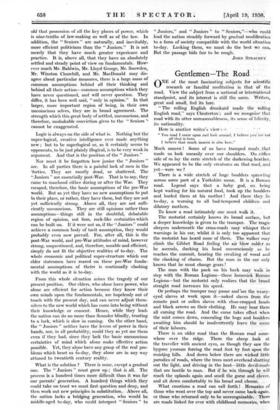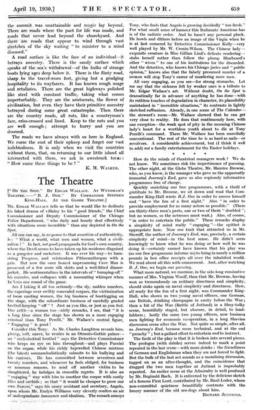. Gentlemen—The Road - - o NE of the most 'fascinating subjects
for scientific research Or' fanciful meditation is that Of the road. Vie* the subject :from a national or International standpoint, and its interest is -still the same. Writers, great and small, feel AS lure.
- "-The rolling English drunkard made the rolling. English road," says ChestertOti-; and we recognize that road with its utter unteasonableneas, its sense of hilarity, its nationality.
Here is another writer's view " YOu road I enter upon and look around, I believe 3.-ou—arO' not all that is here,
I believe that much unseen is also -here."
Much unseen ! Some of us have tramped roads, ,that made us. look uneasily .over our shoulders. On :either_ side of us lay the eerie stretch of the darkening heather.. We appeared to be the only creatures on -that toad., and yet—were we ?
There is a wide stretch of huge ,boulders .sptawling across some part of a Yorkshire moor. It is a Roman road. Legend says that a baby god, on_ being kept waiting for his natural food, took up .the boulders and hurled them at his mother ! And there they he to-day, a warning to all bad-tempered children and dilatory mothers.
To know a road intimately one must walk it.
The motorist certainly knows its- broad surface, but a deeper knowledge is given to the- tramper. The tragic sleepers underneath the cross-roads - may whisper their warnings in his ear, whilst it is only too apparent that the motorist has heard none of them. The walker may climb. the Gibbet Road feeling the air blow colder ,as he ascends, ducking his . head unconsciously, as he reaches the summit, hearing the creaking of wood and the clanking of chains. But the man in the car only knows that -he must, change gears ! .
The man with the pack on his back may Walk in- step with the Roman Legions—those homesick Roman. Legions—but, the motorist only realizes that the broad straight_ road increases his speed. Or perhaps the tramper may pause and 'see the weary-. eyed -slaves at work upon it—naked slaves from the remote past or sullen. slaves with close-cropped heads and black arrows on their clothing. He may hear them all cursing the road. And the curse takes effect when the mist comes down, concealing the bogs- and boulders awaiting him should he inadvertently leave the scene of their labours. . . There is an older . road than the Roman road some- where over the ridge. There the sheep look at the traveller with ancient eyes, as though they saw the bygone yeoman forcing the road foot by foot upon the resisting hills. And down below there are wicked -little. parodies of roads, *here the trees meet overhead shutting out the light, and driving in the heat—little devil4oa1s that are hostile' to man. But it he *in through he will reach the. uplands again and smell the gorse and clover, and sit down comfortably to his bread and cheese.
What emotions a road can call forth ! Memories of those who went over the top and never came back again, or those who returned only to be unrecognizable. There are roads linked for ever with childhood memories, when the summit was unattainable and magic lay beyond. There are roads where the pact for life was made, and roads that never lead beyond the churchyard. And there' are roads that appear to wind through vast Stretches of the sky waiting "to minister to a mind diseased."
A road surface is like the face of an individual—it betrays ancestry. There is the sandy surface which speaks of the sea's withdrawal—of the hulks of strange boats lying ages deep below it. There is the flinty road, sharp to the travel-worn feet, giving but a grudging hospitality to its wayfarers. It has known rough usage 'and ,retaliates. There are the great highways polished like steel with constant traffic, • taking what comes imperturbably. They are the aristocrats, the flower of civilization, but even they have their primitive ancestry betrayed during some great catastrophe. Then there are the country roads, all ruts, like a countryman's face, criss-crossed and lined. Keep to the ruts and you are well enough ; attempt to hurry and you -are doomed.
The roads we have always with us here in England. We curse the cost of their upkeep and forget our vast 'indebtedness. It is only when we visit the countries without them, that, on returning to our little island all intersected With them, we ask in awestruck ton63 "How came these things to be ? "
K. M. WALKER.











































 Previous page
Previous page